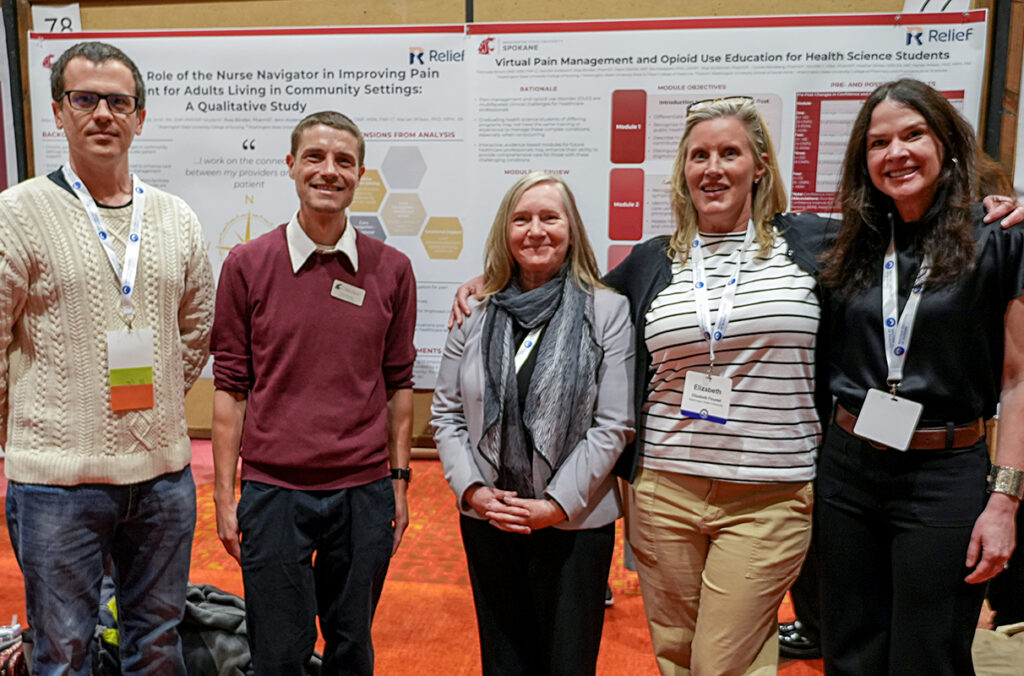WSU-created website helps people self-manage chronic pain
Wednesday, September 3, 2025

SPOKANE, Wash. — An interactive website with evidence-based resources known as the Relief Pain Hub is now available to help people learn more about managing pain.
Washington State University College of Nursing researchers and a team of collaborators developed the site with the support of about $600,000 in opioid settlement funds granted by the Washington State Health Care Authority. The joint project aims to provide better access to strategies that do not rely solely on medications to reduce the dangers of opioids and provide a better quality of life to people with pain.
The site, hosted by the state Health Care Authority and managed by WSU experts, is backed by research on pain relief and directly informed with input from people with pain and health care professionals, said Marian Wilson, the lead researcher and a WSU nursing professor.
“We heard loud and clear from the people in our focus groups that they wanted a resource where they could trust the information on managing pain. We really took that to heart,” she said.
With the massive amount of information about pain on the internet, it can be difficult for the average person to discern what is true, what’s right for them, and what might be a sales pitch, Wilson added. The Relief Pain Hub helps cut through the noise by providing only evidence-backed approaches. With introductory videos and self-assessments on the site, users can also tailor information to their specific situations.
We heard loud and clear from the people in our focus groups that they wanted a resource where they could trust the information on managing pain.
Marian Wilson, nursing professor
Washington State University
“As a nurse and researcher who has worked with patients with chronic pain for the past decade, I believe that most people need to be the captain of their own ship. When it comes to pain management, no one else can understand exactly what you’re experiencing the way that you can,” Wilson said.
Some non-medication approaches to managing pain can include cognitive behavioral therapy, meditation, yoga, exercise and nutrition. The site provides information on those along with managing associated issues since pain can contribute to problems with sleep, depression, anxiety and relationships as well as substance use disorders.
“We know that more than half of people with an opioid use disorder have chronic pain, and in treatment most of the focus goes toward their substance use problems,” Wilson said. “Part of the rationale for this site is that we need to be including pain when we’re addressing a substance use disorder. It really is a comorbid condition in many cases.”
The Relief team is multidisciplinary and includes experts in psychology, pharmacology, medicine, social work and web development with partners from Eastern Washington University and a variety of community-based organizations. There are interactive innovations planned for the site as it evolves such as ways to “gamify” user activities, helping people meet their goals by having them earn points to reward their progress. A “nurse navigator” feature has also been pilot tested using College of Nursing doctoral students to connect those in need with a licensed registered nurse who can help trouble shoot concerns and suggest potential strategies for success. The Relief team recently completed original research that informed the development of this novel community-based Pain Management Nurse Navigator role that has been published in Pain Management Nursing.

Dr. Marian Wilson (center) with Mike Coriasco, Ross Bindler, Beth Feustel, and Fionnuala Brown of the Pain Relief Hub team at this spring’s WIN conference in Spokane.
With many compounding problems related to pain, a short doctor’s office visit is often not enough, Wilson said. Resources and innovations like the nurse navigator on the Relief Pain Hub are designed to help fill that gap.
“Completely eliminating everyone’s pain may not be an achievable goal, but we absolutely can improve quality of life by helping people learn to manage their pain differently,” she said.
In addition, a goal of the Relief grant is to improve training related to pain for Washington state health science students and health care professionals. The team has created educational resources linked on the Relief Pain Hub site to ensure health science students graduate understanding how to properly treat and manage those with pain in a way that is evidence-based and non-stigmatizing. Free continuing educational offerings for working professionals are available as well.
In addition to the Washington State Health Care Authority funding, the development of this site has been informed by previous WSU-led research supported by the National Science Foundation and a number of federal grants regarding pain and substance use led by Wilson and others on the Relief multidisciplinary team.